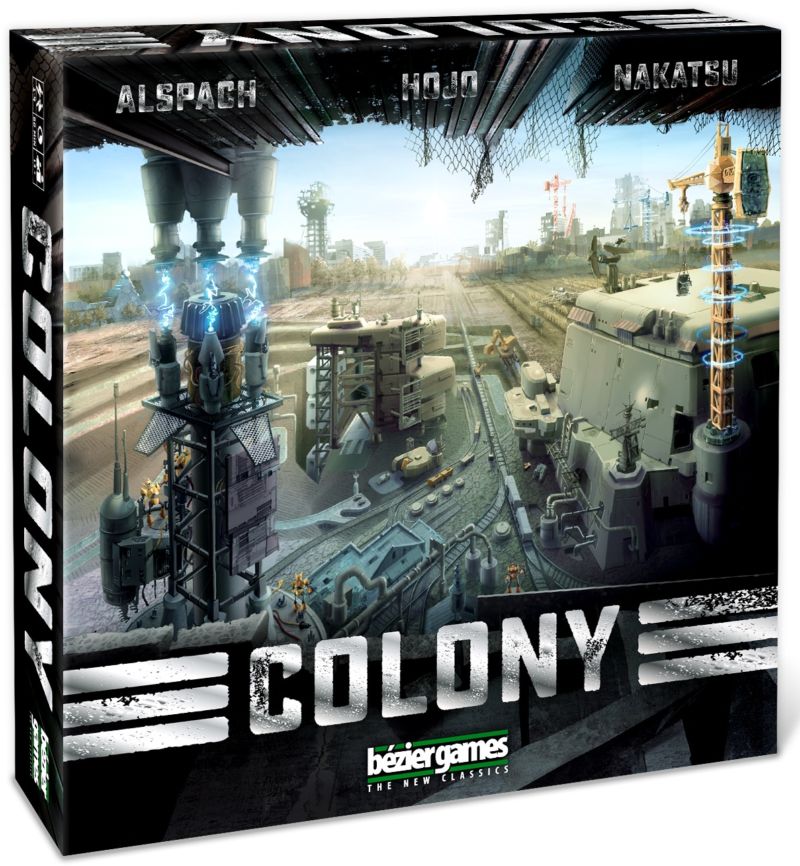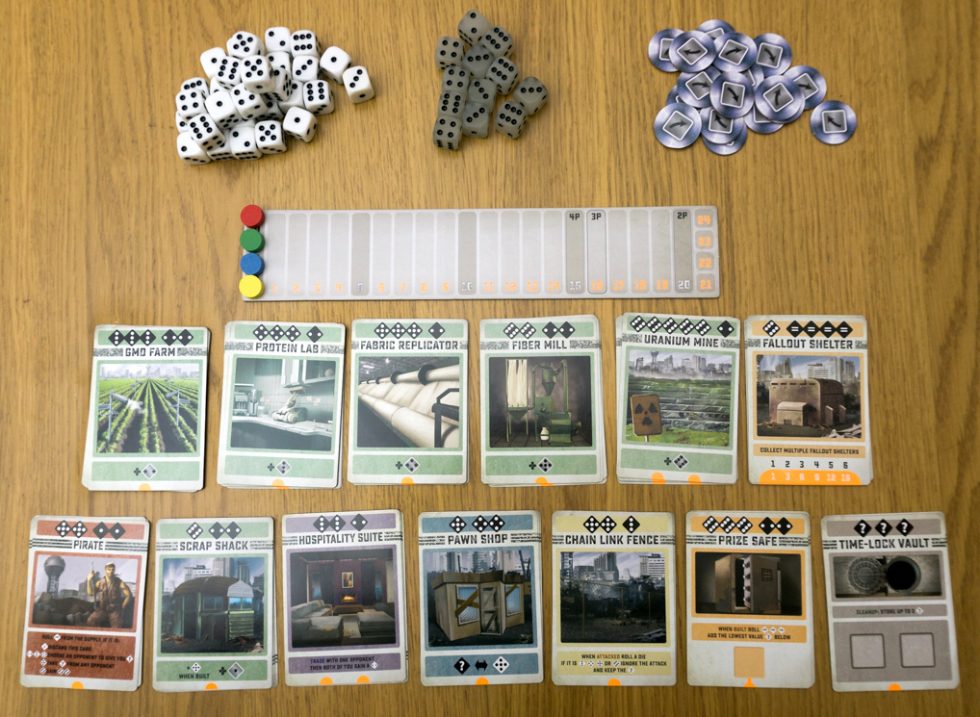
Designer Ted Alspach has something of a reputation when it comes to games about building things. In 2012, he released the city-building game Suburbia, arguably board gaming’s closest equivalent to the iconic video game SimCity. 2014’s follow-up Castles of Mad King Ludwig applied a similar approach to castle construction, and the two titles met with praise from players and critics alike. Now Alspach has returned to similar thematic ground with Colony, a game set in the aftermath of a devastating nanotech apocalypse.
If you’re looking for mechanical similarities to Alspach’s previous tile-laying city builders, though, you won’t find them here. Colony is a card-and-dice game co-created with Japanese designers Toryo Hojo and Yoshihisa Nakatsu. Players control rival settlements attempting to rise from the ashes of civilization, using cards as buildings and dice as the resources required to construct them.
The building process begins before you’ve even started to play. The game comes with a collection of 34 different building types, only 13 of which you’ll use on any given playthrough. When you add them to your city, each building provides a different ability, such as letting you store extra resources or trade with your rivals; different card combinations can make for games that feel quite different to play. You can tailor your game experience, including favorite cards, leaving out others or just using a random selection, and a simple smartphone app (iOS, Android) can generate card combinations if this all seems like too much effort.
-
The Colony score tracker.Owen Duffy
-
The full set of cards, nicely stowed in their box.Owen Duffy
-
A starting city.Owen Duffy
-
The marketplace for buying new buildings.Owen Duffy
-
An example of a developed city in Colony.Owen Duffy
-
Various attack cards from the game.Owen Duffy
From the ground up
Once you’ve chosen the buildings, you’ll lay them out in the center of the table to form a marketplace open to all players. Each building has a cost in the form of resource dice showing a particular set of numbers, and much of the game revolves around accumulating the resources you need to purchase the buildings that best fit your strategy.
On each turn, players roll three resource dice, keeping one for themselves and passing the rest to the player on their left. That player then repeats the process, passing the last remaining die onwards. Players therefore incrementally build up a pool of dice, and on their turns can use these resources to buy buildings. It’s a clever approach which encourages everyone to plan their own turns while their opponents are playing, and while it comes with a heavy element of randomness, it’s mitigated slightly by the fact that you can trade in any two matching dice for one showing a number of your choice.
It doesn’t take long before you’re able to claim your first buildings, and each one offers a different advantage to your city. Production facilities stabilize your economy by granting extra resource dice at the start of each turn—although as “unstable” resources, you won’t be able to store these for use later in the game. Prestige buildings are expensive to acquire but provide new ways to gain victory points. Fallout shelters are tactically useless, but they grant you increasing numbers of points as you accumulate more of them in your city.
Some cards introduce elements of player interaction. Attack cards allow you to snatch resources from rivals. Defensive cards protect you from aggressive opponents. Trade buildings let you swap dice with other players and grant bonuses whenever you complete a deal. Together they lend Colony a pronounced political element. Establish a big lead and you’ll find yourself plagued by raiding parties and shunned by prospective trade partners. Get aggressive in the early game and you can expect a backlash once your rivals have acquired offensive capabilities of their own. Make an obvious play for a particular type of building and your opponents will do their best to ensure you aren’t passed the dice you need to acquire it.

Dystopian flaws
This capacity for diplomacy and passive-aggressive (or sometimes just aggressive) interference with opponents differentiates Colony from the dice-rolling city game Machi Koro—a comparison made by some critics, but one which doesn’t hold up once you’ve played a few rounds. Another difference is the fact that once you’ve built buildings, you can spend additional resource dice to upgrade them, gaining extra victory points and unlocking powered-up versions of their abilities. Warehouses can increase their capacity. Barricades can rebuff attacks from multiple opponents. Shady pawn shops can become valuable sources of useful dice.
Your decisions about which buildings to upgrade are likely more important than the structures you actually build—a fact which highlights one of Colony’s biggest flaws. The cards you buy in the early game are likely to be determined by the resources you have available rather than by any strategic preference, and this can have the effect of wedding you to a particular set of tactics. You may not want to be the aggro player or the trader or the clever manipulator of technologies, but there’s a chance that the dice will force your hand in your first few turns.
You gain greater agency as the game progresses, which means that Colony can be a game of delayed gratification. Wait a little while and you might be able to pull off a neat succession of audacious plays to steal victory. But then again, you might not, and delayed gratification really doesn’t work without the “gratification” bit.
There’s also the fact that the game doesn’t do much to convey its post-apocalyptic theme. Appropriately grim card art shows a world of brutalist concrete grey, but while in theory this is a game about synthetic protein labs, force fields, and uranium mines, it could just as easily be about wheat fields, city walls, and blacksmiths. Even a few columns of fictional world-building fluff would have helped set the scene.
Whether these shortcomings seriously detract from the game’s strengths is likely to depend on your taste. The game does combine several interesting elements. Between drafting dice, building your resource economy, piecing together an efficient engine, and upgrading your buildings over time, there’s a nice sense of progression here. Colony isn’t lacking in clever ideas, but getting to them requires a bit of patience as you’re buffeted by the game’s initial burst of randomness. It’s not, as some reviewers have suggested, a game driven almost entirely by luck, but it does have a tendency to dictate your starting circumstances and then force you to make the best of what you’ve got.
For me, that’s not a deal-breaker, and the possibilities offered by different card setups are seriously intriguing. In spite of its flaws, I’m looking forward to spending more time in this harsh, grey, ravaged future.
Listing image by Owen Duffy
reader comments
9